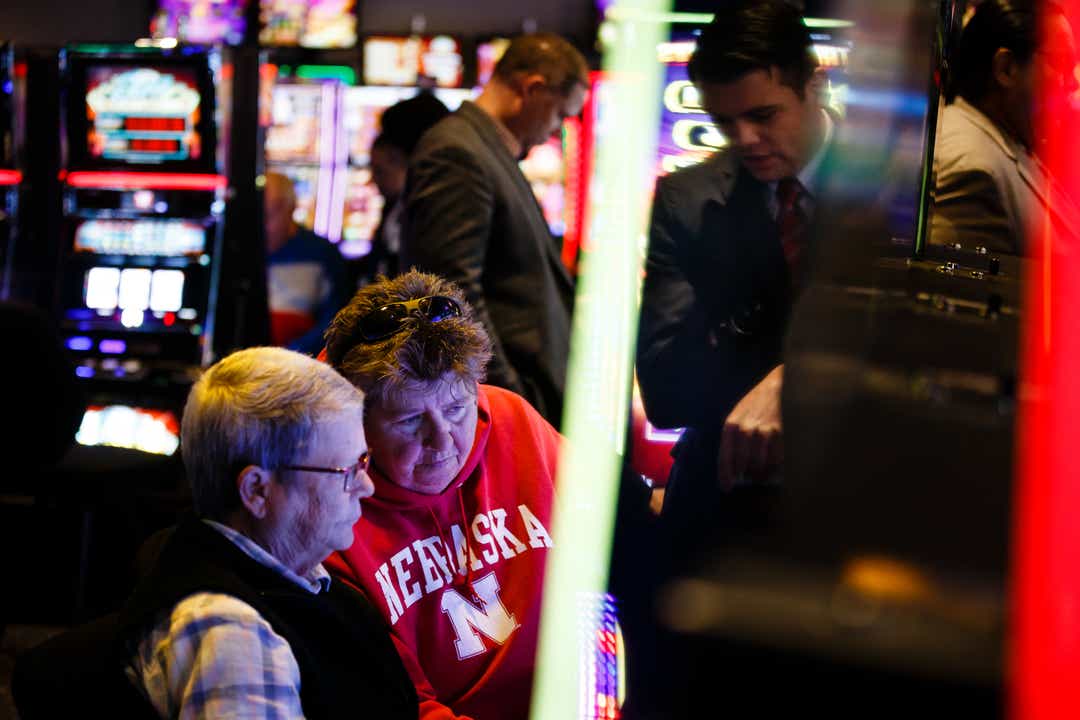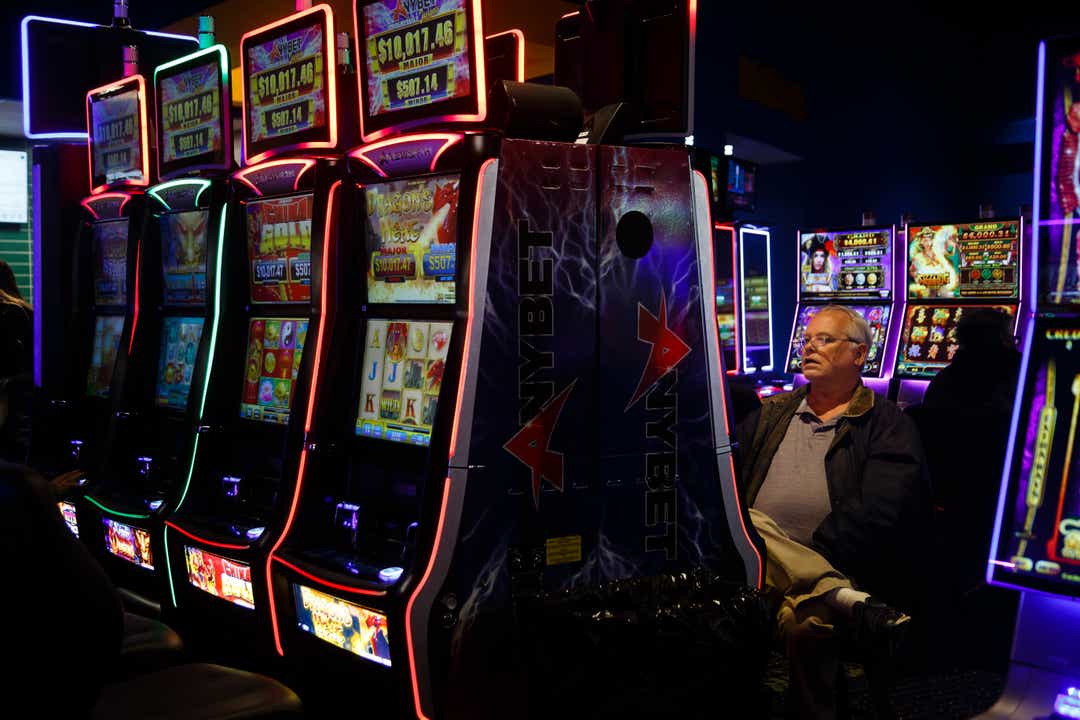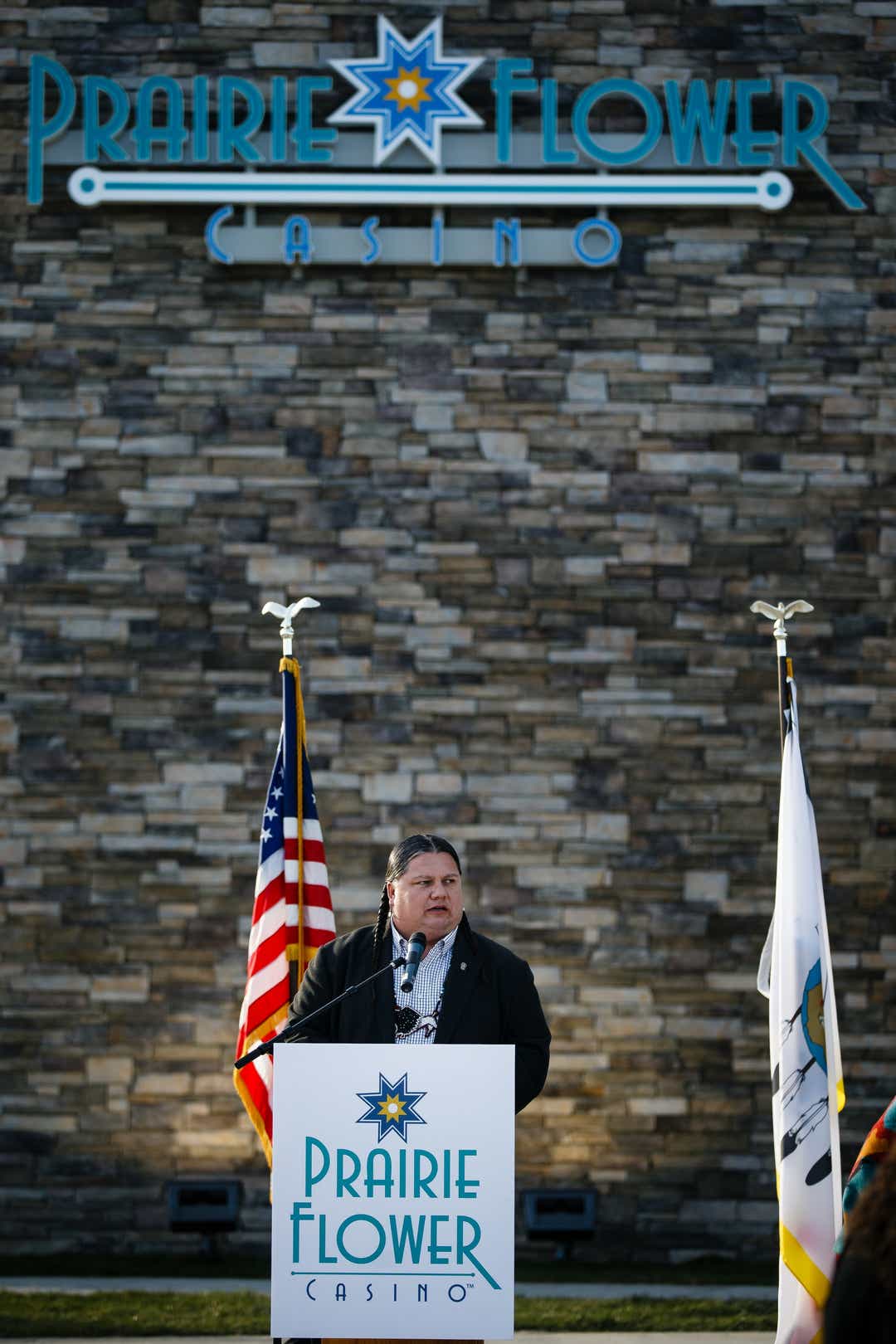CARTER LAKE, Ia. — Surrounded by nondescript industrial buildings in suburban Omaha, Iowa's newest casino is easy to overlook.
It's still surrounded by a yellow construction fence, and commercial jets buzz low overhead from nearby Eppley Airfield. At under 10,000 square feet, the Prairie Flower Casino is one of Iowa's smallest gambling establishments — a far cry from the massive casino complexes just a few miles away in Council Bluffs.
If Iowa and Nebraska officials had their way, it wouldn't be open at all.
But to leaders of the Ponca Tribe of Nebraska, the official opening Thursday of the Carter Lake casino marks a proud milestone for a tribe that has suffered decades of indignities. The Ponca tribe was forcibly removed from Nebraska in the 19th century, lost its federally recognized tribal status in 1966 and saw much of its land slip away as its influence fizzled over the years.

"We have persevered," tribal chairman Larry Wright, Jr. said Thursday as he stood on the bleach-white concrete of the front parking lot. "We are the seeds of resistance of our ancestors. We are survivors and continue to grow stronger every day."
Even as he vowed that the tribe won't be defined by gaming, Wright said the casino would help provide economic stability for future generations, pumping cash into health care, education and cultural activities for the tribe's 4,200 members.
"This is a symbol of our resilience," Wright said, "of a more secure future for our next generations."
Casino embroiled in court fight
The celebration among tribal leaders and local officials belied the conflict brewing behind the scenes, as both Iowa and Nebraska officials work to fight the casino.
The Ponca's casino has made its way through the courts for more than a decade as officials from Council Bluffs and the states of Iowa and Nebraska challenge its legality.
Iowa officials argue that federal law doesn't allow a casino on the property because it's not federally restored land as defined in the Indian Gaming Regulatory Act.
Nebraska has joined the legal fight, pushing against the casino because of its unique location: Carter Lake is Iowa's only community west of the Missouri River, making it easily accessible to residents of Omaha, where Nebraska law bans casinos.
Council Bluffs, in turn, is particularly concerned about the affect Prairie Flower would have on its three large, non-tribal casinos on the Iowa side of the Missouri River, which pump millions of dollars into state and local budgets each year.
A tribal casino isn't obligated to pay local taxes, and Council Bluffs argues it will unfairly compete with the other casinos.
But lawyers from both sides said Thursday's opening won't significantly affect the ongoing federal lawsuit.
"The casino’s opening doesn’t change our position," said Lynn Hicks, spokesman for Iowa Attorney General Tom Miller. "We intervened because we believe a federal agency interpreted the law incorrectly."
More: Removed from the land before, Ponca nation vows to protect the Earth from Keystone XL
More: With future generations in mind, Iowa's Meskwaki tribe looks to diversify business profile
Council Bluffs balks at casino's 'unfair advantage'
The tribe owns about 5 acres in Carter Lake, and Wright said it could expand the casino significantly "when the time is right."
When the tribe purchased the land in 1999, it announced plans to build a health center there. But Carter Lake's unique geography — the Missouri River changed course during an 1877 flood and permanently separated the city from the rest of territorial Iowa — immediately raised suspicions that the tribe would seek to build a gambling facility there.
To quell concerns, in 2002 an attorney representing the tribe inked a pledge that the site would not be used for gaming (the tribe now argues that the attorney wasn't authorized to approve such an agreement).
"There was concern at the time that they were buying it for a casino," said Council Bluffs Mayor Matt Walsh said. "And they said, 'No, no, we’ll sign papers saying it won't be a casino.'"

Council Bluffs relies on gambling revenues from its three Ameristar, Harrah's and Horseshoe casinos. Walsh said they are primarily frequented by Nebraskans, who cross the Missouri River to play.
Last year, the three cumulatively earned profits of nearly $420 million, according to the Iowa Racing and Gaming Commission's annual report. That year, those three casinos paid nearly $94 million in state and local taxes.
That included about $4 million directly to Council Bluffs, which also benefits from another $7 million in annual charitable contributions made throughout the region, Walsh said.
Those casinos also drive up hotel tax revenue, employ thousands of people and drive spending in restaurants and gas stations. Walsh said he worries that the tax-free Prairie Flower will steal business from the Council Bluffs casinos, which pay tax rates of 22 to 24 percent.
"They (Prairie Flower) wouldn't pay any income taxes," Walsh said. "So it's an unfair advantage."
When Council Bluffs' casinos opened in the 1990s, market studies at the time determined there was adequate demand to add gaming establishments. But Walsh said the dynamics of the casino industry have changed.
"Young people today don’t go to casinos like their parents did," the mayor said. "It's one of those things that's of generational use. And every year it seems to go down in the actual dollars spent."
Ponca tribe says competition is 'not illegal'
Most Indian casinos operate in cooperation with their local counties and cities, said Ernest Stevens Jr., chairman of the National Indian Gaming Association.
Nationally, Indian gaming brought in more than $31 billion in revenues in 2016, he said. That money funds healthcare, infrastructure and other programs, "rebuilding forgotten communities," he said.
"There are so many things that are a reality for Indian Country because of Indian gaming," Stevens said.
The Ponca tribe has agreed to contribute $775,000 of Prairie Flower's earnings each year to the city of Carter Lake — a figure that may be renegotiated if the casino expands. Wright said enrolled Ponca members live throughout the region in both states. And members of many native tribes use local Ponca facilities for health care services.
"We're part of the community. We've been part of the community," the chairman said. "Competition, last I heard, was not illegal and so we're just doing what we believe is our sovereign right."

The casino's opening already was the hot topic at a Perkins restaurant down the road Thursday morning. Customers at several tables fueled up on eggs and pancakes before playing the slots. Several waitresses speculated whether the casino would boost business.
"We're going to use this as a tool," said Carter Lake Mayor Ron Cumberledge. "We're going to bring in more tourism, more people to town. It's going to benefit all the surrounding businesses and we're going to build on this."
That's a rare opportunity for the tiny, 2-mile-square town with about 3,700 residents and limited resources. Cumberledge brushed off concerns that Prairie Flower would hurt the bottom line of the three Council Bluffs casinos.
"You know, I'm in business myself," he said. "Competition is good."
Could a court force the casino to close?
On Sept. 27, Iowa, Nebraska and Council Bluffs officials wrote to tribal leadership urging them to delay the casino's opening, arguing that a federal ruling could force the tribe to repurpose the casino.
"Delaying the opening of this facility until the federal court issues a decision would help minimize these risks, particularly the harm to the careers of employees who are accepting positions at a gaming facility that may be found in violation of Federal law," the government officials wrote.
That was just the latest legal maneuvering in a case that has simmered since 2007, when the National Indian Gaming Commission first determined that the Ponca land was eligible for gaming under the Indian Gaming Regulatory Act.
A federal court overruled that decision before the 8th Circuit Court of Appeals remanded the case back to the National Indian Gaming Commission, which approved the casino again in November 2017. Council Bluffs then filed suit challenging that decision.
Contacted by the Des Moines Register, the commission declined to comment on the pending litigation.
The tribal chairman wrote back to Iowa and Nebraska officials on Oct. 4, saying the tribe had patiently waited for regulatory approval for years.
"The Tribe cannot afford to wait longer," Wright wrote, "given the needs of its people."
On Thursday, Wright voiced confidence in the commission's two decisions to permit gambling in Carter Lake.
'This has been a long struggle'
The first phase of the Prairie Flower facilities, which includes 200 slot machines, a bar and a snack bar, is about 9,500 square feet. That's slightly smaller than a new Polo Ralph Lauren outlet store that opened in suburban Des Moines in early October.
It's also smaller than all 19 state-regulated casinos. Iowa is also home to three other tribal casinos: Meskwaki Bingo Casino in Tama, Blackbird Bend Casino in Onawa and WinnaVegas Casino Resort in Sloan.
Prairie Flower is the only casino in Iowa that doesn't have a compact with the state to offer Class III gaming. While its brightly lit slot machines look similar to those that fill other casinos, they operate more like bingo machines.
Aaron Baack, deputy director of the Iowa Department of Inspections and Appeals, said consumers exclusively play against other players with Class II gaming, rather than against the house the way they do with Class III gaming.
As other casino operators worry about its impact, state gambling officials are closely watching gambling revenues in Council Bluffs, one of the state's biggest casino markets.
"Most people believe a casino opening in Carter Lake will certainly impact revenue in the Council Bluffs market," said Brian Ohorilko, administrator of the Iowa Racing and Gaming Commission.
But that didn't seem to dampen spirits Thursday.
Wright said tribal elders and leaders celebrated with a private event at the casino Wednesday evening. He noted that some elders had died in the years since the tribe first started laboring to bring gaming to Carter Lake.
"It hasn't hit me yet," he said. "This has been a long struggle."
About the name Prairie Flower
The Ponca Tribe of Nebraska's new casino is named after the daughter of famed Chief Standing Bear, who led the tribe during its 1877 forced removal from the Nebraska Terrority in present-day Oklahoma.
Along the Ponca Trail of Tears, at least 11 deaths were recorded, including that of the chief's daughter, Prairie Flower.
Standing Bear was later captured near Omaha while leading a small group of Ponca fleeing miserable conditions in Oklahoma.
The chief's ensuing suit for a writ of habeas corpus ushered in a landmark decision: A judge ruled that American Indians were people and entitled to protection under the law.
In the courtroom, the chief famously faced the audience and held up his right hand. Though his hand was of a different shade from theirs, he said, his and theirs would equally feel pain if pierced.
"The blood that will flow from mine will be of the same color as yours," Standing Bear said. "I am a man. God made us both."
| < Prev | Next > |
|---|






 Copyright © 2024 ToCasino.net Online Casino. All Rights Reserved. Designed by
Copyright © 2024 ToCasino.net Online Casino. All Rights Reserved. Designed by